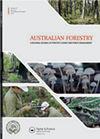Assessing the thermal adaptability of tree provenances: an example using Eucalyptus tereticornis
IF 1.2
4区 农林科学
Q3 FORESTRY
引用次数: 3
Abstract
ABSTRACT A 2017 paper intended to assist climate-change studies concluded that provenances of the widely distributed Eucalyptus tereticornis ‘are not differentiated in their thermal responses’ in terms of photosynthesis, respiration and growth. The aim here was to place this surprising result, based on a short-term (48-day) experiment with seedlings of just three provenances, into the broader context of several years’ growth of provenances of the same species. To do this, a re-analysis of results from trials of 14 provenances of E. tereticornis was undertaken. These were grown for 3.5 or 5.0 years at four contrasting sites in southern China spanning mean annual temperatures (MAT) from 15.0°C to 23.5°C. The analysis described here compares MATs at climate-of-origin with volume growth. It demonstrates an approach that could easily be applied to provenance studies of other commercially important species. It makes use of the ready access to distributional and climatic data provided by a modern biodiversity database, the Atlas of Living Australia. Some of the provenances showed a surprising level of adaptability to climates markedly different to those of their origin. At the warmest site in China, however, the growth of the provenances was significantly related to the MAT at their climate-of-origin. It is concluded that researchers considering the likely impacts of climate change on tree species may find it useful to examine results from commercial provenance trials as well as from glasshouse experiments with seedlings.树木种源的热适应性评价——以圆桉为例
摘要2017年一篇旨在帮助气候变化研究的论文得出结论,广泛分布的圆叶桉种源在光合作用、呼吸和生长方面“在热反应方面没有差异”。这里的目的是将这一令人惊讶的结果,基于对三个种源的幼苗进行的短期(48天)实验,放在同一物种种源几年生长的更广泛背景下。为了做到这一点,对14个种源的试验结果进行了重新分析。这些植物在中国南方的四个对比地点生长了3.5年或5.0年,年平均温度(MAT)从15.0°C到23.5°C。本文所述的分析将原始气候下的MAT与体积增长进行了比较。它展示了一种可以很容易地应用于其他商业重要物种种源研究的方法。它利用现代生物多样性数据库《澳大利亚生活地图集》提供的现成的分布和气候数据。一些种源对气候的适应性水平惊人,与它们的原产地明显不同。然而,在中国最温暖的地区,种源的生长与其起源气候的MAT显著相关。结论是,考虑到气候变化对树种可能产生的影响,研究人员可能会发现,检查商业种源试验以及温室幼苗试验的结果是有用的。
本文章由计算机程序翻译,如有差异,请以英文原文为准。
求助全文
约1分钟内获得全文
求助全文
来源期刊

Australian Forestry
FORESTRY-
CiteScore
3.70
自引率
4.80%
发文量
15
审稿时长
>12 weeks
期刊介绍:
Australian Forestry is published by Taylor & Francis for the Institute of Foresters of Australia (IFA) for scientific, technical, and professional communication relating to forestry in the Asia Pacific.
 求助内容:
求助内容: 应助结果提醒方式:
应助结果提醒方式:


